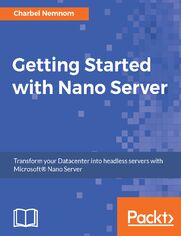Getting Started with Nano Server - Helion

Tytuł oryginału: Getting Started with Nano Server
ISBN: 978-17-852-8465-6
Format: ebook
Data wydania: 2017-06-30
Ksi─Ögarnia: Helion
Cena ksi─ů┼╝ki: 169,00 z┼é
Remain highly competitive in the server and VM market by gaining the practical skills needed to operate Nano Server
About This Book
- The days of the local server are numbered, and this book will make you an ace by giving you the skills needed to administer Nano Server and survive in the brave new server world
- Learn to quickly automate multiple VMs and support Hyper-V clusters, all through small footprints from a single host
- Apply up-to-date, real-world examples presented in this book and improve the scalability and efficiency of large-scale VM deployments
Who This Book Is For
This book opens up new potential for both developers and IT pros alike. The book is primarily for Server administrators and IT Professionals who would like to deploy and administer Nano Server within their organizations, and for developers who are trying to make maximal use of Server Containers and Hyper-V Containers with Nano Servers.
What You Will Learn
- Understand Nano Server
- Deploy Nano Server
- Deploy Hyper-V Clusters on Nano Server
- Deploy Nano Server with SCVMM
- Manage Nano Server using PowerShell and Remote Server Management Tools
- Manage Nano Server with third-party tools
- Run Server Containers and Hyper-V Containers on Nano Server
- Troubleshoot Nano Server
- Validate developed applications that run on Nano Server
In Detail
Nano Server allows developers and operations teams to work closely together and use containers that package applications so that the entire platform works as one. The aim of Nano Server is to help applications run the way they are intended to. It can be used to run and deploy infrastructures (acting as a compute host, storage host, container, or VM guest operating system) without consuming significant resources. Although Nano Server isn't intended to replace Server 2016 or 2012 R2, it will be an attractive choice for developers and IT teams.
Want to improve your ability to deploy a new VM and install and deploy container apps within minutes? You have come to the right place! The objective of this book is to get you started with Nano Server successfully. The journey is quite exciting, since we are introducing you to a cutting-edge technology that will revolutionize today's datacenters.
We'll cover everything from the basic to advanced topics. You'll discover a lot of added value from using Nano Server, such as hundreds of VM types on a single host through a small footprint, which could be a big plus for you and your company. After reading this book, you will have the necessary skills to start your journey effectively using Nano Server.
Style and approach
Gauge all the information needed to get up-and-running with the latest Nano Server built by Microsoft using this easy to follow step-by-step guide.
Osoby które kupowały "Getting Started with Nano Server", wybierały także:
- Mastering DevOps in Kubernetes 84,60 zł, (71,91 zł -15%)
- Puppet Types and Providers 64,99 zł, (55,24 zł -15%)
- Strategic DevOps 99,41 zł, (85,49 zł -14%)
- AWS Cloud Practitioner Exam Guide 99,41 zł, (85,49 zł -14%)
- Backend Software Architecture using Golang 99,41 zł, (85,49 zł -14%)
Spis tre┼Ťci
Getting Started with Nano Server. Automate multiple VMs and transform your datacenter eBook -- spis tre┼Ťci
- 1. Introduction to Windows Nano Server
- 2. Getting Started with Windows Nano Server
- 3. Deploying Nano Server in a Virtual Machine and on a Physical Hardware
- 4. Deploying Hyper-V Cluster on Nano Server
- 5. Deploying, Managing, and Monitoring Nano Server with System Center 2016
- 6. Managing Nano Server with Windows PowerShell and Windows PowerShell DSC
- 7. Managing Nano Server with Third-Party Tools
- 8. Running Windows Server Containers and Hyper-V Containers on Nano Server
- 9. Running other workloads on Nano Server
- 10. Running Other Workloads on the Nano Server





